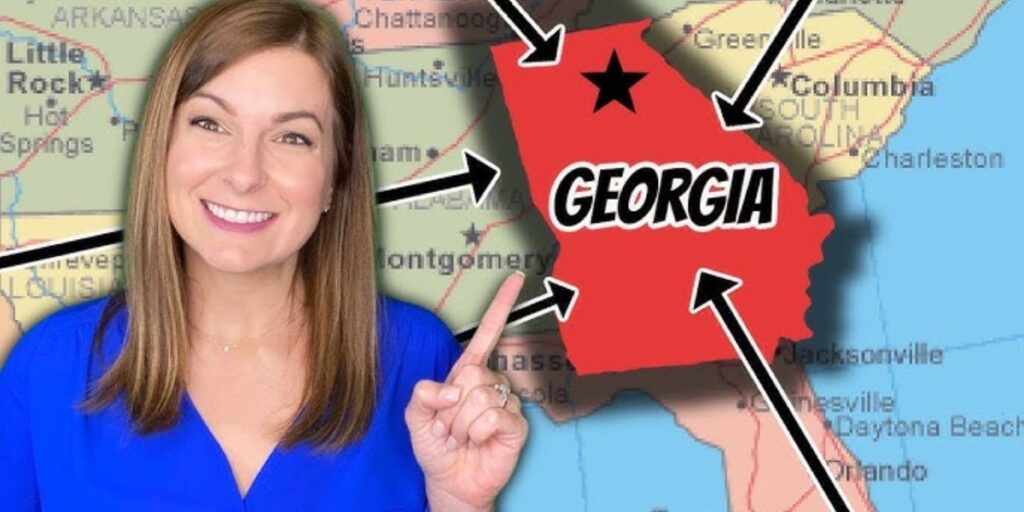Georgia has become one of the top relocation spots in the U.S., with its mild winters, booming cities, and Southern charm drawing thousands of new residents every year. But before you pack your bags and head to the Peach State, it’s worth taking a closer look.
Beneath the surface, Georgia isn’t for everyone. From the sweltering summers to growing pains in metro areas like Atlanta, here are seven reasons why Georgia might not be the right place for you.
1. The Summer Heat and Humidity Can Be Brutal
One of the most common complaints from new residents? The weather—especially in the summer. Georgia’s heat can be oppressive, with temperatures regularly climbing into the high 90s, accompanied by thick, suffocating humidity. If you’re not used to that sticky Southern air, it can be a real shock.
Air conditioning is practically a requirement year-round, and outdoor activities become nearly unbearable in July and August. Those used to dry heat or cooler climates may find the weather to be more of a curse than a blessing.
2. Traffic in Metro Atlanta Is a Daily Nightmare
Thinking about moving to Atlanta or its suburbs? Prepare for traffic unlike anything you’ve experienced. Atlanta consistently ranks among the worst U.S. cities for traffic congestion.
With sprawling development and limited public transportation options, residents often find themselves stuck in gridlock during rush hours that seem to last all day. The infamous “Spaghetti Junction” and I-285 are notorious for slowing down even the most seasoned commuters. If you’re not ready to spend hours a week in your car, you might want to think twice.
3. Allergies Are a Real Problem Here
Georgia is beautiful in the spring—but it comes with a price. The state ranks high for seasonal allergies, especially pollen allergies. Every spring, a yellow-green film of pollen covers everything—cars, patios, even pets.
For those sensitive to allergens, this can mean months of sneezing, watery eyes, and constant discomfort. If you suffer from allergies, you may want to speak with a doctor before committing to life in the state.
4. Limited Public Transportation
Outside of Atlanta’s MARTA system, Georgia lacks robust public transportation infrastructure. In most towns and cities, owning a car isn’t just a convenience—it’s a necessity. Suburban sprawl and rural development patterns mean that many essential services aren’t within walking distance.
For people moving from cities like New York, Chicago, or San Francisco, the absence of reliable, extensive public transit can be a major adjustment.
5. Crime Rates in Some Areas Are Concerning
While many parts of Georgia are safe and family-friendly, others struggle with crime. Atlanta in particular has seen spikes in violent crime in recent years, and smaller cities like Macon and Albany also rank high in crime statistics.
Potential newcomers should research neighborhoods carefully, as safety can vary dramatically even within the same zip code. Living in a safer suburb may mean trading affordability or proximity to the city for peace of mind.
6. The Bugs and Wildlife Might Surprise You
If you’re not a fan of bugs or critters, Georgia may not be your dream state. The warm, humid climate is a haven for mosquitoes, fire ants, palmetto bugs (think flying roaches), and even the occasional snake.
In more rural or wooded areas, encounters with deer, coyotes, and other wildlife are common. While nature lovers might appreciate this, many newcomers are caught off guard by just how wild Georgia can feel, even in suburban settings.
7. Political Divide and Culture Shock
Georgia is a mix of urban liberalism and rural conservatism, which can create a unique—and at times tense—political atmosphere. Major cities like Atlanta lean blue, while much of the rest of the state remains deeply red.
This divide can affect everything from school policies to local laws, and the culture can be drastically different depending on where you live. For some transplants, adjusting to Southern traditions, religious influences, or differing political views can be more challenging than expected.
Conclusion
Georgia offers plenty of perks—lower cost of living, rich history, and warm Southern hospitality. But it also comes with a unique set of challenges that aren’t always visible in travel brochures or Instagram photos. From traffic and crime to pollen and political polarization, it’s essential to look beyond the glossy real estate ads before making a big move.
If you’re still drawn to the state after doing your homework, great. But if some of these drawbacks give you pause, you’re not alone. Moving somewhere new is a big decision—and finding the right fit matters more than following the trend.





More Stories
Before You Move to Georgia, Read This: 7 Reasons It Might Not Be the Best Fit
Before You Move to Georgia, Read This: 7 Reasons It Might Not Be the Best Fit
Before You Move to Georgia, Read This: 7 Reasons It Might Not Be the Best Fit